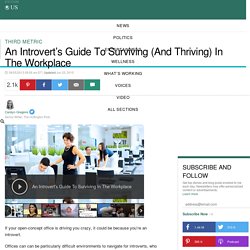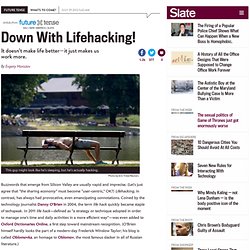

An Introvert's Guide To Surviving (And Thriving) In The Workplace. If your open-concept office is driving you crazy, it could be because you’re an introvert.

Offices can can be particularly difficult environments to navigate for introverts, who gain energy and generally feel their most productive in quiet and solitude — and the constant stimulation and social interactions can be taxing. Add on possible misperceptions about their personalities and work style from extroverted bosses and colleagues, and it’s enough to make an introvert want to work from home full-time.
“At the heart of it, introverts and extroverts respond really differently to stimulation,” Susan Cain, author of Quiet: The Power Of Introverts In A World That Can’t Stop Talking, tells The Huffington Post. “Introverts feel most alive and energized when they’re in environments that are less stimulating — not less intellectually stimulating, but less stuff going on.” “The way most offices are set up now is disastrous,” Cain says. Find spaces for quiet and solitude. Avoid meetings when possible. 5 Unexpected Ways To Spark Your Creative Genius.
The great, 18th-century poet Friedrich Schiller, liked to have a smell of rotten apples on nose hand when manifesting his masterpieces.

Exhale: You needn't keep a compost of spoiled fruit around to do something great. While a strike of creative genius can't necessarily be forced, there are a few clever ways to get your juices flowing: Use your nose. Maybe Schiller was on to something. When your head's not working, your nose might be of assitance. Do something utterly monotonous. Turn off the telly. Keep a dry-erase marker by your bathroom mirror. Write by hand. Even more, you'll be using more brainpower when you choose to write by hand: Virginia Berninger, professor of educational psychology at the University of Washington, says the act stimulates a much larger portion of the brain’s thinking and "working memory" regions than does typing. Writing by hand might also pull you out of routine (since we're all so mercilessly plugged-in) and incite something new within.
Also on HuffPost: What Happened When My Son Wore A Pink Headband To Walmart. Lifehacking is just another way to make us work more. Photo by Eric Vidal/Reuters Buzzwords that emerge from Silicon Valley are usually vapid and imprecise.

(Let's just agree that “the sharing economy” must become “user-centric,” OK?) Lifehacking, in contrast, has always had provocative, even emancipating connotations. Coined by the technology journalist Danny O'Brien in 2004, the term life hack quickly became staple of techspeak. In 2011 life hack—defined as “a strategy or technique adopted in order to manage one’s time and daily activities in a more efficient way”—was even added to Oxford Dictionaries Online, a first step toward mainstream recognition. The original thinking behind “lifehacking” was intriguing. In practice, of course, things are more complicated. Two new books offer some curious, if indirect, perspectives on lifehacking.
To innovate, argues Smart, we must learn how to be idle—at a time when most corporations see idleness as a vice. From Smart's perspective, lifehacking is far too utilitarian.